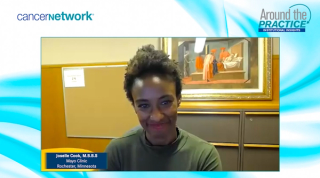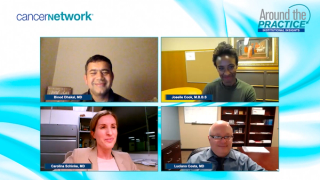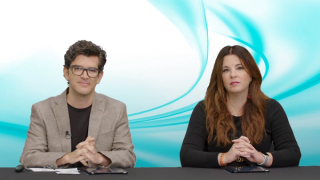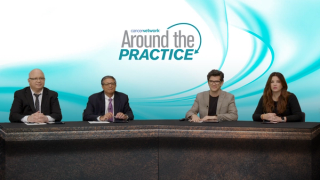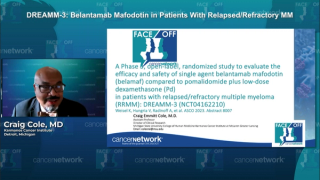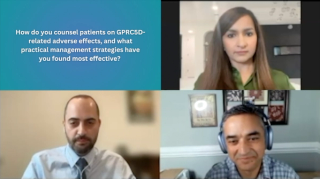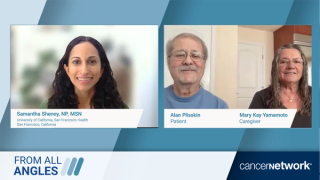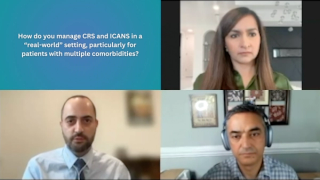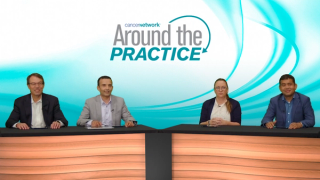
Multiple Myeloma
Latest News
Video Series

Latest Videos
CME Content
More News
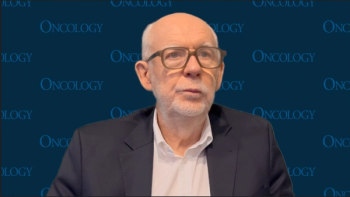
Andrzej Jakubowiak, MD, PhD, prioritizes KRd-based regimens for the treatment of high-risk newly diagnosed disease in the posttransplant setting.

Although a similar proportion achieved MRD negativity at the 10 to the –6 power, not enough studies have analyzed MRD at this level for multiple myeloma.

Panelists discuss how CAR T-cell therapy should generally precede bispecifics when possible due to T-cell exhaustion concerns, though they agree there are virtually no absolute contraindications to bispecific therapy.
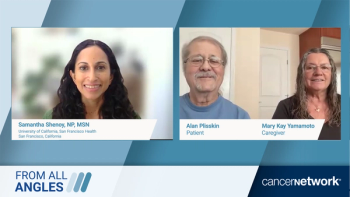
Panelists discuss how health care providers must actively educate local oncologists, emergency departments, and community centers about bispecific antibody management as these therapies move from inpatient to outpatient settings, ensuring proper recognition and treatment of adverse effects such as cytokine release syndrome (CRS).
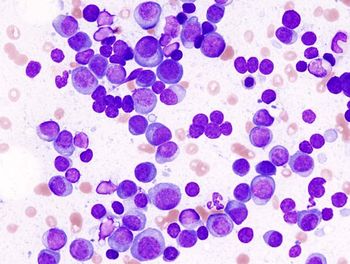
Patients with multiple myeloma who received palonosetron, dexamethasone, aprepitant, and olanzapine achieved a 44.1% CR rate across all study phases.

D-VRd had a 72% chance of providing superior PFS outcomes vs isatuximab plus VRd in patients with transplant-ineligible NDMM.

Panelists discuss how bispecifics are reversing the historical paradigm of diminishing returns in relapsed/refractory multiple myeloma, achieving 60% to 70% response rates lasting over a year in heavily pretreated patients.

Panelists discuss how patient preferences for treatment-free intervals are increasingly important in therapy selection, with bispecifics offering potential for response-adapted dosing and early discontinuation while maintaining remissions.

Treatment with anito-cel shows a predictable and manageable safety profile among those with relapsed/refractory multiple myeloma in the iMMagine-1 trial.

Panelists discuss how successful talquetamab treatment requires coordinated care between inpatient and outpatient teams, comprehensive caregiver preparation including education materials and emergency contact information, and access to multidisciplinary health care providers as needed.

Panelists discuss how expectations for treatment outcomes can become more positive over time through experience with multiple therapies, staying informed about clinical trials and new treatments, and focusing on quality of life as a primary treatment goal alongside disease control.
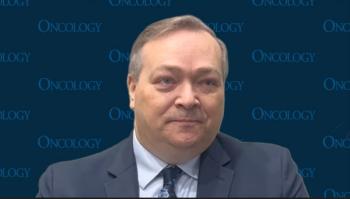
Patients with high-risk markers may especially benefit from the addition of daratumumab to lenalidomide as maintenance therapy for NDMM.

Karen Kehl shares her decade-long journey with multiple myeloma, discussing treatment options and the impact of bispecific antibodies like talquetamab with Binod Dhakal, MD.
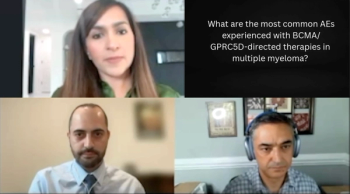
CRS, neurotoxicities, and infections are the most common AEs associated with BCMA- and GPRC5D-directed therapies in patients with multiple myeloma.

Marc S. Raab, MD, PhD, details how agents such as carfilzomib may play a role in treatment after progression on teclistamab-based induction therapy.

Panelists discuss how caregivers can navigate the initial shock of a myeloma diagnosis by seeking reliable information from trusted medical websites, connecting with local support groups, and accessing resources from organizations such as the International Myeloma Foundation (IMF), Multiple Myeloma Research Foundation (MMRF), and patient advocacy groups.

Panelists discuss how Alan Plisskin's multiple myeloma diagnosis began with severe back and hip pain, progressed through life-threatening complications, including seizures and vocal cord paralysis, and revealed extensive lytic lesions throughout his body that required immediate intensive treatment.

The median PFS was not reached with daratumumab-lenalidomide maintenance after a median follow-up of 49 months in those with multiple myeloma.

Recent advancements in multiple myeloma treatment highlight the efficacy of daratumumab combined with VRd, showcasing improved outcomes and tolerability.

The VGPR or better rate was 87.8% in patients treated with Isa-VRd who had transplant-ineligible newly diagnosed multiple myeloma.

No TRAEs leading to dose discontinuation, DLTs, or belantamab-related corneal events above grade 1 occurred with belantamab in multiple myeloma.

Updated findings from AURIGA support the value of adding subcutaneous daratumumab to lenalidomide maintenance in MRD-positive NDMM after transplant.

Phase 1b/2 BGB-11417-105 trial data showed low rates of high-grade infection and hematologic toxicity with sonrotoclax-based therapy in multiple myeloma.

Belantamab mafodotin plus lenalidomide and dexamethasone yielded a stringent CR of 42.9% in patients with newly diagnosed multiple myeloma.

Daratumumab, lenalidomide, ixazomib, and dexamethasone yielded PFS/OS outcomes in transplant-ineligible, newly diagnosed myeloma.






